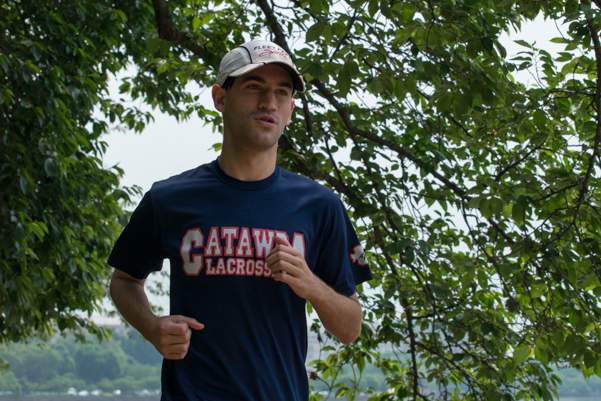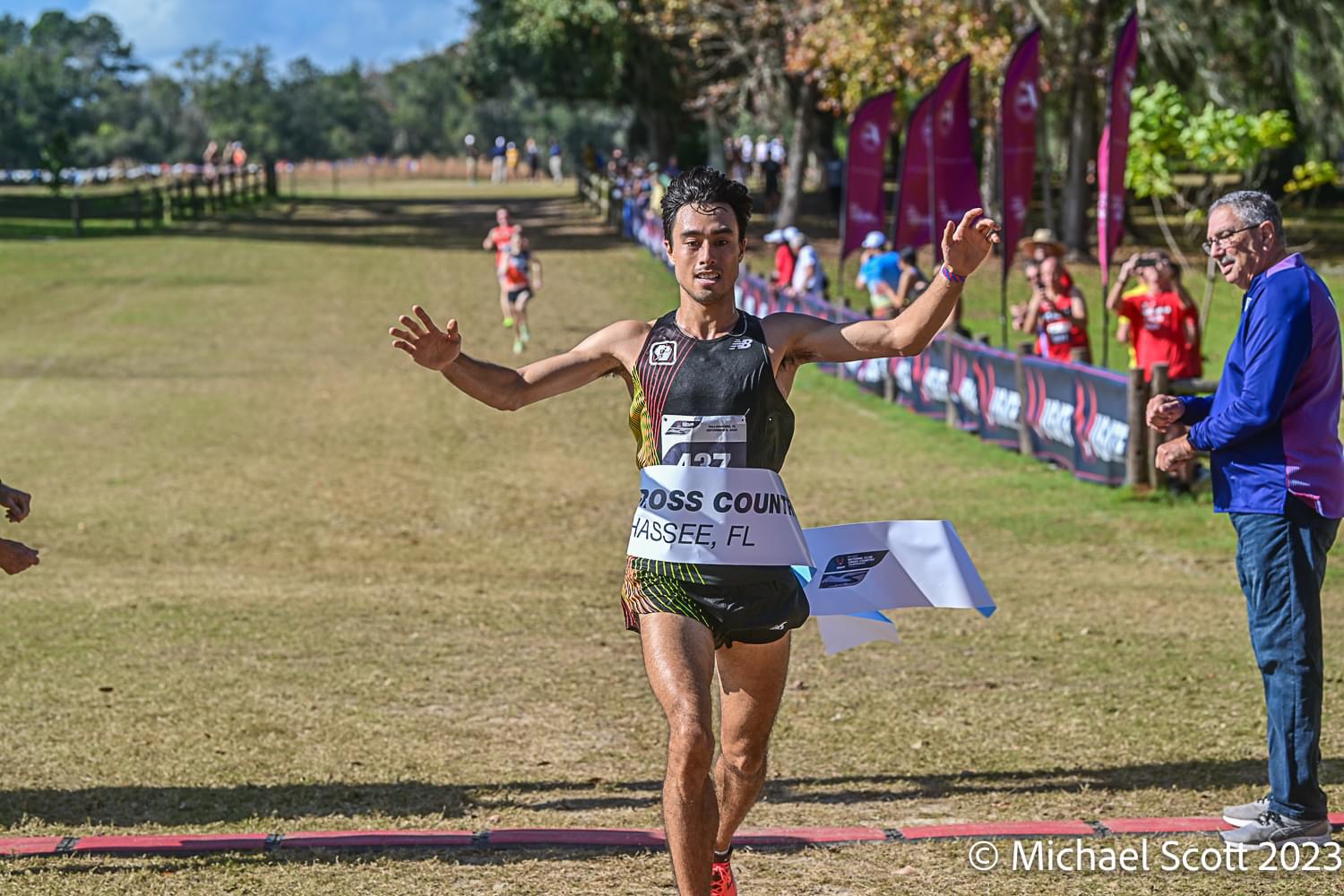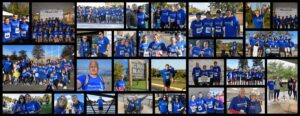
For most people, running remains a hobby at the end of the practice, the end of the race, the end of the day.
Not for David Finland.
“Running was a key thing for me,” he said. “I didn’t have anything to do. [Life] was kind of boring.”
He’s now completed five marathons, including the ING New York City Marathon and the vaunted Marine Corps Marathon.
Finland, of McLean, was four or five when his autism was diagnosed. The family’s doctor prescribed medications, but the drugs caused bouts of Tourette syndrome.
“They seemed to undermine his natural body rhythms,” said Glen Finland, David’s mother.
The family had also begun reading about research that detailed the positive effects of exercise for autistic children. Glen enrolled her son in soccer because his two older brothers played. The game didn’t stick.
“But boy could he run,” Glen said. “A beautiful runner. It surprised us all. We decided to drop the meds he was on.”
They called the new regimen “David Unplugged.”
At McLean High School, Finland served as a water boy for the football team. The track coach noticed Finland sprinting on and off the field.
“The speed he had,” Glen said, “it was a natural grace.”
The best medicine
At its core, autism is a disease of brain development that also affects motor skills.
The American Psychiatric Association released a new edition of its diagnostic manual in 2013 and officially changed the definition and criteria for the condition. Autism disorder spectrum, now referenced as autism spectrum disorder, better encompasses the range of symptoms and severity individuals express.
“Autism is not static,” Glen said. “It changes all the time. There’s always some new battle to fight.”
Running allowed Finland to become part of the mainstream society at the high school, an immense step for anyone who seeks a niche within the social groups of that formative time period.
He competed for the varsity cross country team and ran several distance events for the track team.
“It was huge,” Glen said. “This was his first taste of being a regular guy and all the personal freedom that went along with running.”
Running didn’t cure everything, though.
Kids still noticed some of his muscle ticks. Teammates started calling him Crazy Dave.
“That made me sick at heart,” Glen said. “He said the nickname made him cool.”
Despite any negative encounters related to the sport, Finland continued to run. He moved on to marathons in the years after his high school running debut. His first event was Marine Corps.
“I was really nervous and really not sure if I actually wanted to be there that day,” he said. “It was overwhelming. Mile number eight I started to feel more comfortable, and toward the end I realized, ‘Hey, I really like doing this.’”
When he trained for marathons, Finland ran eight to 10 miles in the evenings.
“My favorite run is along the Potomac River and running along the National Mall,” he said.
He’s planning on running New York this fall, but also wants to continue racing 5ks and 10ks, with a potential half marathon in the mix. He’s cut his training to five- and six-mile runs, plus stair workouts.
This type of routine seems commonplace for most active runners in the area, but the sport has created exceptional benefits for Finland. Running is the medication that keeps him at his best.
“My whole mind is clear,” he said. “It feels like a brand new start for me. After I’m done, I’m not thinking at all. My head is empty.”
That vacancy disappears on days when he can’t work out.
“It doesn’t feel good at all,” he said. “I’m a little bit angry. I’m a little bit confused. I’m a little stressed. There’s too much going on in my mind. I can’t concentrate.”
And if running were taken from him completely, “that would ruin my life right there. I wouldn’t be the same again.”
The need to run
Physical activity for anyone with a disability can become a challenge, one that negatively affects overall well-being.
A February 2014 study published in the Maternal and Child Health Journal looked at weight issues and learning disabilities. The study evaluated data from 9,600 people ages 12 to 17, with and without disabilities, from 2008 to 2010. Researchers found that nearly one-third of adolescents with autism qualified as obese.
And the problem could escalate.
Researchers have not yet been able to explain the rising numbers of autism diagnoses in this country. For instance, the current estimate of autism’s prevalence in the U.S. population is based on 2010 census data for 8-year-old children. Those children are identified under the pre-2013 definition of the disease, when a diagnosis referred to separate conditions such as Asperger syndrome. Although improved detection could contribute to the recent surge, that explanation does not rule out an actual increase in cases.
Academic research has shown that kids with ASD typically have fewer options for recreational physical activity, but the disease doesn’t preclude children from exercise. Underdeveloped social skills can limit participation more than physical impairments. For example, schools often host team-based athletics that rely on social cues and constructs.
“That’s the beauty of running,” Susan Pereles said. “You can do it as a solo activity. You can do it as a group.” Pereles is the field development director in the National Capital Area office for Autism Speaks, an advocacy organization that funds research and awareness activities.
Researchers have also identified positive attributes of an activity like running, including the fact that the rhythms match repetitive motions sometimes associated with autistic individuals and that the sport remains available to people throughout their lifetimes.
Even if an autistic person doesn’t always run with a group, he or she can take part in warm-ups, cool-downs and stretching.
“Running with a lot of people doing the same thing I’m doing is kind of a thrill for me,” Finland said.
He’s tried a few running groups, but he still prefers to train alone.
“I find it easier to run when you’re alone,” he said. “You’re not distracted by who’s running with you.”
Still, he hasn’t abandoned the prospect of having someone to match him stride for stride.
“Hopefully one day I‘ll have a running partner,” he said.
Until then, what Finland has acquired through running is a concrete sense of self-sufficiency. “You’re the only person you are in charge of. You don’t have anybody to tell you what to do or where to go. You’re running at your own convenience.”
That autonomy was something his mother both wanted and feared.
“It’s helped me learn to let him go,” Glen said, “to trust him more on his own.”
She wrote about that process — including her son’s first solo Metro rides and his pursuit of a driver’s license — in a memoir called Next Stop.
“On one hand,” she said, “I’m pushing him to do it. On the other hand, I’m crouching behind saying careful, careful. Parents of special needs kids find it a little more difficult because the stressors, the challenges are different.”
Many people contend that the car represents the quintessential American freedoms of movement and expansion. Runners might match their sport with the car. Finland accomplishes a bit of both.
His license plate reads MST FNSH.
Recent Stories
Looking for our race calendar? Click here Submit races here or shop local for running gear
James W. Foley Freedom Run
Inspired by the moral courage of freelance journalist James Foley, the mission of the nonprofit Foley Foundation is to secure the freedom of Americans held captive abroad unjustly by terrorist organizations or rogue states, and to promote journalist safety.
The
Kensington 8K Race
Since 1994, the Kensington 8K Race has been a favorite DC area fall race – a fun, fast event with beauty, challenge, and excitement. Run it this year on Saturday, September 21, 2024!
The 8K distance is $39, with a






